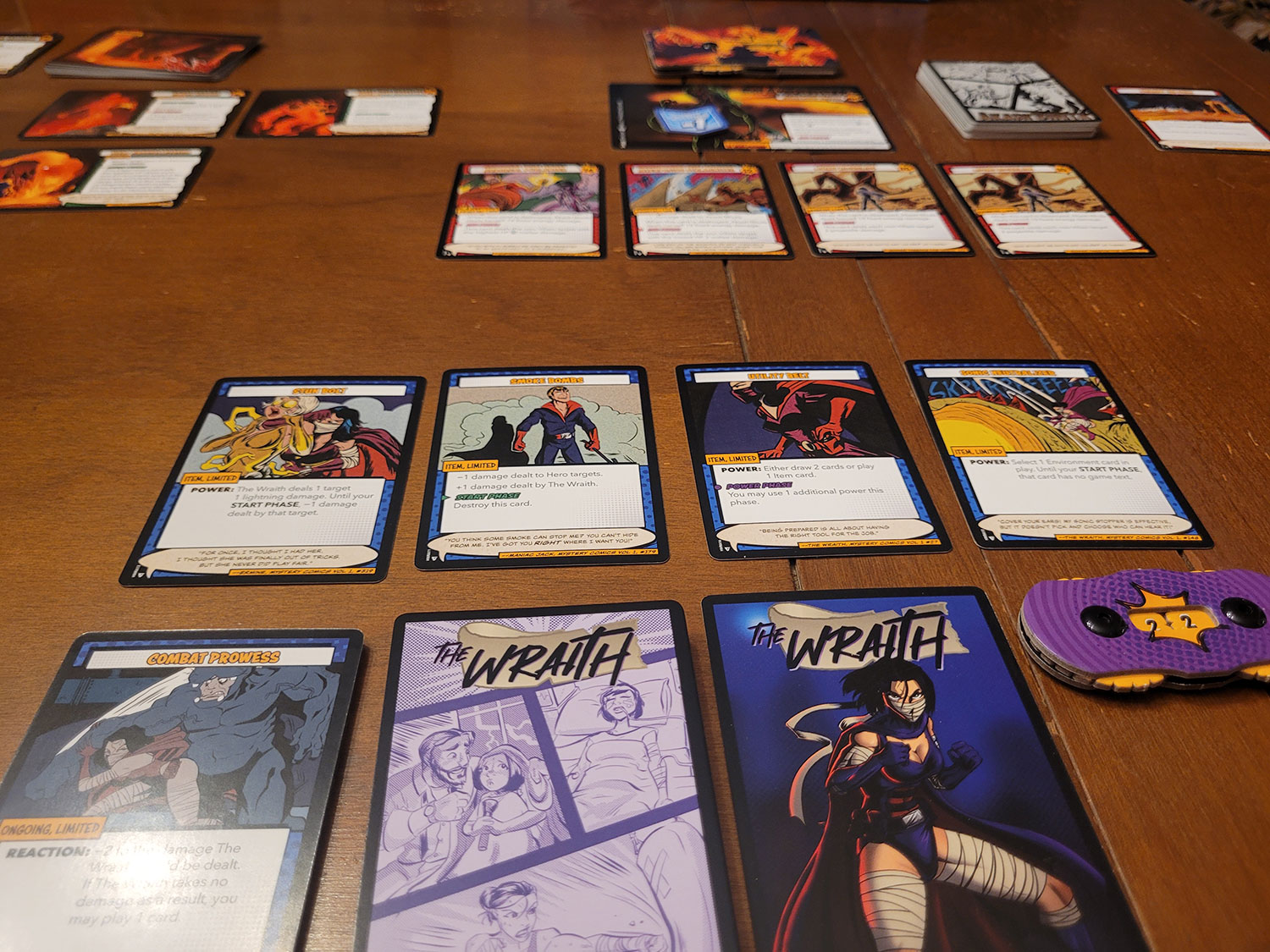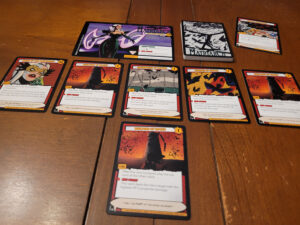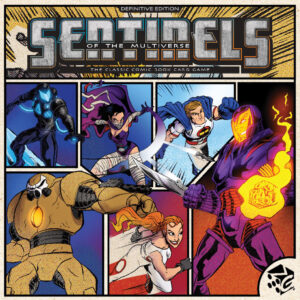 Scenario-driven cooperative card games are an enticing proposition, but also a potential cause for concern. In theory, you get a flexible rules system, capable of sustaining hours of enjoyment with an initial purchase, with the promise of future content in the form of expansions. In practice, these games can be wildly uneven in quality, suffering from a lack of content, an underbaked design, or both.
Scenario-driven cooperative card games are an enticing proposition, but also a potential cause for concern. In theory, you get a flexible rules system, capable of sustaining hours of enjoyment with an initial purchase, with the promise of future content in the form of expansions. In practice, these games can be wildly uneven in quality, suffering from a lack of content, an underbaked design, or both.
Sentinels of the Multiverse was an early entry into this arena, and more than a decade after its initial release, Greater Than Games has come out with Sentinels of the Multiverse: Definitive Edition–a re-mastered version of the original with streamlined rules and a wealth of updated content. Does this venerable design stand the test of time?
Sentinels of the Multiverse: Definitive Edition is a cooperative card game for 1-5 players that plays in around 60 minutes. It plays best with 3-4 players.
Gameplay Overview:
In Sentinels of the Multiverse: Definitive Edition (just “Sentinels of the Multiverse” from here on), 3-5 Heroes will face off against a Villain in a given Environment, with players controlling multiple heroes in 1- or 2-player games. Each Hero, Villain, and Environment has its own distinct deck, so setting up a game is a matter of setting out a few decks of cards.

Each round of Sentinels of the Multiverse is split up into Villain, Hero, and Environment Turns, and each Turn is roughly split into three phases: the Start Phase, Play Phase, and End Phase. Start and End Phases are primarily used to trigger card effects, but in the Play Phase, one card is played from the deck belonging to whichever turn it is. Each Hero Turn also comprises a Power Phase, which lets that Hero activate a single “Power” effect, and a Draw Phase, which lets the Hero draw more cards.
On the Villain and Environment Play Phase, cards are played randomly from the top of the deck, but during a Hero Turn, that Hero may play a single card from their hand. Some cards have one-off effects, but most cards will stay in play, and represent different things depending on which deck they come from—a vat of toxic acid from the Environment deck, a dastardly minion from the Villain deck, or a special weapon coming from a Hero Deck.
All Heroes and Villains have a starting HP value and are incapacitated when their HP reaches 0. When a Hero is incapacitated, they are still able to act in a very limited capacity, but players lose when all Heroes are incapacitated. If the Heroes are able to reduce the Villain to 0 HP before that point, the Heroes win.

Game Experience:
Sentinels of the Multiverse: Definitive Edition is a lovingly crafted package. The art of this new edition is fantastic, and the amount of content is kind of staggering. In addition to a healthy amount of Heroes, Villains, and Environments, there are also Hero Variant cards (which slightly remix that Hero’s play style), Events (which provide thematic scenarios against Villains), and even Critical Events, which give variant cards for some of the Villains. For its price, Sentinels of the Multiverse might be some of the best value you can get in a cooperative game.

And when you get to play it, the game within that package is excellent. There’s a tense and extremely comic-book-y balance between building your hero’s arsenal, putting out fires, and assaulting the villain head-on. Cooperation is also heavily encouraged, as many Heroes are focused more on supporting others than doing direct damage themselves. Heroes play wildly differently, and the Villains all have interesting gimmicks that make them feel unique. I have a special fondness for the Environments, which add a welcome bit of chaos and flavor to each game.
Unfortunately, you don’t always get to play Sentinels of the Multiverse that much. On its surface, this is a simple game, but because the written rules are so light, the complexity of the game is tucked away in the card text and keywords, and there is a lot of card text and keywords. After just a few rounds, the table will be aswarm with cards, each with their own specific game effects, to the point that the vast majority of players’ time is spent parsing the game state, rather than making decisions.

Worse, the game state here is not an easy thing to parse. There are a whopping eleven different kinds of damage and different cards modify (or prevent modification of) specific types of damage, so it’s tedious to keep track of all these modifiers at once. My group didn’t even finish a handful of our games due to our frustration with the game’s upkeep … which says a lot considering how fun we found the underlying decision-making.
These problems are bad with 3-5 players, but with 1 or 2 players the game is almost unplayable. Each player has to control multiple Heroes, which means that, in addition to parsing the game state, you also have to keep two (or even three!) different Heroes separate and complete in your head at any time. At lower player counts, Sentinels of the Multiverse turns from a frustrating game to a torturous math problem.
Final Thoughts:
If you’re able to get past Sentinels of the Multiverse’s tangled web of overlapping card effects, there is a great game here, full of memorable moments that feel ripped right out of a comic book. The definitive edition also has more than enough content to last a long, long time. Unfortunately, while there is a great game here, I don’t know if it’s worth uncovering within the current board game climate. Nowadays, there are so many games that are as fun as Sentinels of the Multiverse, but with much less frustration involved.
Final Score: 3.5 Stars – Excellent decision-making and cooperation, tainted by an overreliance on tedious administration. Still worth playing in a vacuum, but not as good as many of its contemporaries.
 Hits:
Hits:
• Tons of variety and content
• Extremely thematic
• Great sense of cooperation
Misses:
• Bad at low player counts
• Lots of tedious administration
• Actually, though, so much tedious administration
Source: Board Game Quest





